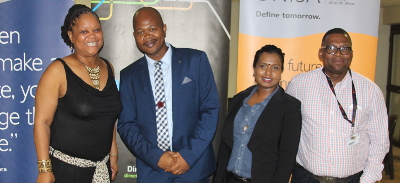News & Events
Unisa-KZN launches computer literacy guide

Dr N Phewa, Mrs M Naidoo, Mr S Zama, Mr X Dubazane
On Monday, 26 March 2018, Unisa-KZN launched their student computer literacy guide. Dr Nombulelo Phewa, KZN Acting Regional Director, welcomed guests. She applauded the good work done by her team and thanked Van Schaik Bookstore for partnering with this region and sponsoring the printing of the computer literacy learner guide.
Mr Sifiso Mkhungo (Technology Enhanced Learning) and Mr Siyabonga Zama (Digital Learning Advisor) in Durban are the drivers of this project. After identifying various student needs in the Durban computer laboratory, they came up with the concept of this user-friendly computer literacy guide to assist Unisa students. Ms Maryanne Naidoo, Branch Manager of Van Schaik Bookstores in Durban, collaborated with Unisa KZN and sponsored the printing of the guide. Mr Xolani Dubazane (Deputy Director: Academic and Technology Support) emphasised the importance of partnerships between Unisa and stakeholders.
The guide will be available electronically in the near future and students will be able to download it. The printed guide will be made available to students in all the Unisa-KwaZulu Natal computer laboratories and at the multi-purpose centres where Unisa have formal agreements.
* By Mduduzi Ndunakazi
Publish date: 2018/04/19
